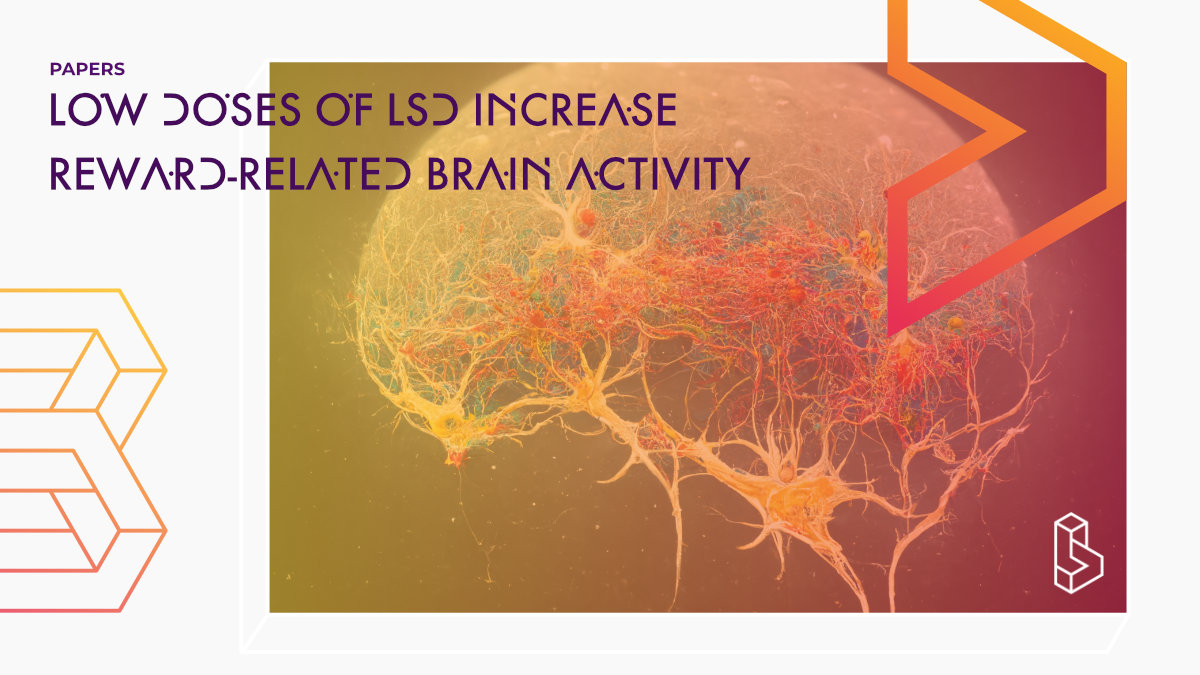This double-blind placebo-controlled study (n=18) explored the effects of two microdoses of LSD (13 & 26 μg) on reward processing using a monetary incentive delay task. LSD increased three reward-related ERP components reflecting increased hedonic, motivational, and affective processing of feedback, indicating that LSD increases reward-related activity in humans.
Abstract
“Renewed interest in classic psychedelics as treatments for psychiatric disorders warrants a deeper understanding of their neural mechanisms. Single, high doses of psychedelic drugs have shown promise in treating depressive disorders, perhaps by reversing deficits in reward processing in the brain. In addition, there are anecdotal reports that repeated ingestion of low doses of LSD, or “microdosing”, improve mood, cognition, and feelings of well-being. However, the effects of low doses of classic psychedelics on reward processing have not been studied. The current study examined the effects of two single, low doses of LSD compared to a placebo on measures of reward processing. Eighteen healthy adults completed three sessions in which they received a placebo (LSD-0), 13 μg LSD (LSD-13) and 26 μg LSD (LSD-26) in a within-subject, double-blind design. Neural activity was recorded while participants completed the electrophysiological monetary incentive delay task. Event-related potentials were measured during feedback processing (Reward-Positivity: RewP, Feedback-P3: FB-P3, and Late-Positive Potential: LPP). Compared to the placebo, LSD-13 increased RewP and LPP amplitudes for reward (vs. neutral) feedback, and LSD-13 and LSD-26 increased FB-P3 amplitudes for positive (vs. negative) feedback. These effects were unassociated with most subjective measures of drug effects. Thus, single, low doses of LSD (vs. placebo) increased three reward-related ERP components reflecting increased hedonic (RewP), motivational (FB-P3), and affective processing of feedback (LPP). These results constitute the first evidence that low doses of LSD increase reward-related brain activity in humans. These findings may have important implications for the treatment of depressive disorders.”
Authors: James Glazer, Conor H. Murray, Robin Nusslock, Royce Lee & Harriet de Wit
Summary of Low doses of LSD increase reward-related brain activity
The last decade has witnessed a renewed interest in classic psychedelics as therapeutic agents for psychiatric disorders. Although many studies suggest single, relatively high doses of psychedelic drugs can improve mood and anxiety disorders, repeated, very low doses of LSD may also improve mood, cognition, and well-being.
The current study used electrophysiological measures to examine the effects of repeated low doses of LSD on reward processing.
Find this paper
Low doses of lysergic acid diethylamide (LSD) increase reward-related brain activity
https://doi.org/10.1038/s41386-022-01479-y
Paywall | Google Scholar | Backup | 🕊
Study details
Compounds studied
LSD
Topics studied
Microdosing
Neuroscience
Study characteristics
Placebo-Controlled
Double-Blind
Within-Subject
Participants
18
Humans
Authors
Authors associated with this publication with profiles on Blossom
Harriet de WitHarriet de Wit is a Professor of Psychiatry and Behavioral Neuroscience at the University of Chicago. Her research focuses on the physiological, subjective (i.e., mood-altering), and behavioral effects of drugs in healthy human volunteers.
Institutes
Institutes associated with this publication
University of ChicagoResearch with psychedelics is taking place at the Human Behavioral Pharmacology Lab at the University of Chicago.
Compound Details
The psychedelics given at which dose and how many times
LSD 13 - 26μg | 2x

